The Political Forces Behind the Attack on the Voting Rights Act
Take it from the ultraconservative and increasingly unrestrained Supreme Court Justice Antonin Scalia: What’s really at stake in the case of Shelby County v. Holder isn’t simply the technical constitutionality of Sections 4 and 5 of the Voting Rights Act of 1965, but the "perpetuation of racial entitlement" in the law’s renewal.What's at stake isn’t simply the constitutionality of the law but as Justice Antonin Scalia said, the "perpetuation of racial entitlement" in its renewal.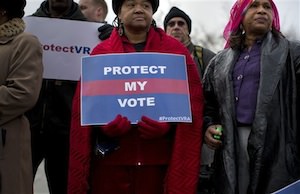
Take it from the ultraconservative and increasingly unrestrained Supreme Court Justice Antonin Scalia: What’s really at stake in the case of Shelby County v. Holder isn’t simply the technical constitutionality of Sections 4 and 5 of the Voting Rights Act of 1965, but as he remarked during Wednesday’s oral argument in the case, the “perpetuation of racial entitlement” in the law’s renewal.
We can thank Scalia for his candor, not just because his comment telegraphed his expected vote on the matter, but because the remark demonstrated how closely he and the four other Republican appointees to the high court have aligned themselves with the right-wing and libertarian interest groups behind the Shelby litigation.
Those organizations — whose ranks range from well-known right-wing think tanks such as the Federalist Society and the American Enterprise and Cato institutes to relatively obscure nonprofits such as the Virginia-based DonorsTrust foundation and the Project on Fair Representation — form a de facto alliance that aims at nothing less than a wholesale transformation of constitutional law to limit, if not altogether prohibit, the use of federal power on behalf of historically oppressed minorities. The Voting Rights Act is simply the target of the day.
Anyone who followed the voter suppression schemes that swept the nation in the runup to November’s presidential election will recall that Section 5 of the Voting Rights Act requires states and local jurisdictions with a chronic history of racial or minority-linguistic discrimination in elections to obtain approval, or “preclearance,” from the Justice Department or a federal court before making any changes that affect voting. Under a formula implemented by Section 4 of the act, the preclearance requirement applies to certain “covered” jurisdictions — currently, nine states (mostly in the South) in their entirety, along with a scattering of counties, cities and political subdivisions in seven other states. The act also permits covered jurisdictions with a 10-year history of nondiscrimination to apply to the Justice Department for an exemption (or “bailout”) from the preclearance process.
Justice Department attorneys invoked Section 5 last year in lawsuits that blocked suppression schemes in Texas, South Carolina and Florida, involving such issues as voter ID, redistricting and polling hours. The DOJ’s success was due in part to the fact that under Section 5 the burden falls on the covered jurisdictions to prove that any proposed voting law changes are nondiscriminatory.
In Wednesday’s oral argument and in briefs filed earlier, Shelby County’s lawyer –the savvy and well-respected conservative Washington, D.C., litigator Bert Rein — told the court that Section 5 was no longer needed because “the problem to which the Voting Rights Act was addressed is solved.”
According to Rein, the days of overt electoral discrimination are over, and the preclearance rule unconstitutionally infringes state sovereignty in violation of the 10th Amendment. In any event, the county contends, Section 2 of the act will remain on the books even if Section 5 is voided, and will permit either the federal government or private individuals to sue any jurisdiction after the fact for unfair voting practices.
What Rein didn’t say during oral argument, however, was that although Shelby County is nominally the plaintiff in the lawsuit, it is in reality a proxy for the right-wing alliance that conceived, funded and initiated the lawsuit in the first place.
Located near the geographic center of Alabama at the southern end of the Appalachian Mountains outside of Birmingham, Shelby has just over 195,000 residents, according to the 2010 census, 80 percent of whom are white. The county also has a history of discriminatory election practices, including a Section 5 complaint over a 2006 redistricting plan. And while the county is comparatively affluent by Alabama standards and has long wanted to see Section 5 overturned, its local counsel has acknowledged that it just didn’t have the money to mount a challenge to the act on its own.
All that changed in 2010, when the county was approached by Edward Blum (no relation) of the Project on Fair Representation. A former Paine Webber stockbroker and currently a visiting scholar at the American Enterprise Institute, Blum founded the project in 2005 to oppose the 2006 congressional reauthorization of the Voting Rights Act and the use of race-based legal protections generally.
With financial backing from the institute and DonorsTrust (which draws support from various funding sources, including the William E. Simon Foundation and the Searle Freedom Trust), Blum offered to pick up Shelby’s expenses, connect the county with attorney Rein and bring in amicus (friend of the court) support from other conservative legal organizations across the country. A lawsuit was filed and within two years was pending before the Supreme Court.
Shelby v. Holder isn’t the first Voting Rights Act case that Blum, who is not a lawyer, has marshaled all the way to the nation’s highest tribunal. He performed a similar role in a 2009 case (Northwest Austin Utility District No. 1 v. Holder), in which the Supreme Court upheld Section 5 but not without noting that the act’s preclearance provisions raised “serious constitutional questions.” Blum is also credited with recruiting college student Abigail Fisher to serve as the plaintiff, and Rein to work as her attorney, in the challenge to affirmative action in higher-education admissions that the Supreme Court heard earlier this term (Fisher v. University of Texas).
A onetime college liberal who drifted to the right in the 1980s and ran unsuccessfully as a Republican in a 1992 Houston congressional race against an African-American Democrat, Blum in more progressive times may have been just another right-wing crank operating in a political bubble and a time warp, flailing away at the impossible task of returning the country to the early 1950s.
But at the Supreme Court these are by no means progressive times. Each of the court’s conservative justices reportedly is or has been a member of the Federalist Society, and each appears eager to join Blum and his colleagues in a mutual quest to reset the historical clock.
Your support is crucial…With an uncertain future and a new administration casting doubt on press freedoms, the danger is clear: The truth is at risk.
Now is the time to give. Your tax-deductible support allows us to dig deeper, delivering fearless investigative reporting and analysis that exposes what’s really happening — without compromise.
Stand with our courageous journalists. Donate today to protect a free press, uphold democracy and unearth untold stories.
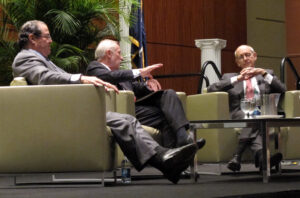
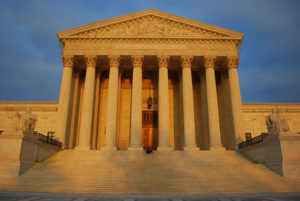
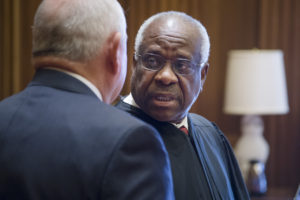
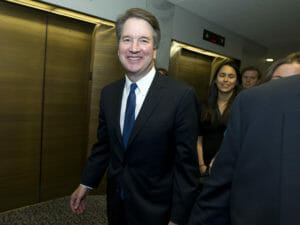
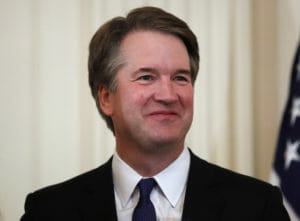
You need to be a supporter to comment.
There are currently no responses to this article.
Be the first to respond.